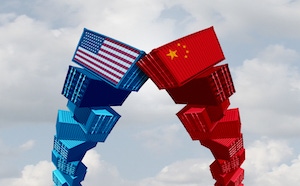First, do no harm, medtech industry urges Trump
Approximately $800 million worth of medical devices and components made in China are targeted by the Trump administration for a 25% tariff, scheduled to go into effect on July 6. That is sending a chill through Minnesota’s medtech industry.
June 28, 2018

 The medical device industry is increasingly rattled by the tit-for-tat tariffs imposed by the United States and China and the prospect of a full-blown trade war. Approximately $800 million worth of medical devices and components made in China are targeted by the Trump administration for a 25% tariff, scheduled to go into effect on July 6. That is sending a chill through Minnesota’s medtech industry, reports the StarTribune.
The medical device industry is increasingly rattled by the tit-for-tat tariffs imposed by the United States and China and the prospect of a full-blown trade war. Approximately $800 million worth of medical devices and components made in China are targeted by the Trump administration for a 25% tariff, scheduled to go into effect on July 6. That is sending a chill through Minnesota’s medtech industry, reports the StarTribune.
“U.S. hospitals and distributors will likely absorb the brunt of the new import taxes hitting Chinese-made medical devices and components next month, but jobs and research in Minnesota's bustling medical-technology sector could be threatened if a full trade war with China breaks out,” writes StarTribune reporter Joe Carlson.
Home to medtech giant Medtronic, Minnesota and the Minneapolis-St. Paul area, in particular, have positioned themselves as one of the United States’ premier medical technology hubs. Minnesota was ranked second, just behind California, by sister brands Qmed and MD+DI in a survey of the top 10 medical manufacturing states. China is an important trading partner for the state’s medical technology industry.
“China is the largest single buyer of medical devices and optical supplies from Minnesota, with exports up 14 percent to $192 million in the first three months of this year,” writes Carlson. It is also a substantial sales market for Medtronic, which has nearly one million square feet of manufacturing and research space in China, slightly more than it has in Minnesota, according to the StarTribune. At a gathering for investors, Medtronic CEO Omar Ishrak said that the “China market is going to be, at some time in the future, the biggest market in medtech.”
The medical imaging sector is especially worried that the tariffs will have a negative impact on its industry and potentially affect patient access to medical innovation.
“We have serious concerns the proposed tariffs will impede patient access to medical innovation by taxing inter-company transfers, wherein a company will manufacture component parts in China before shipping them to the U.S. for final assembly and export,” said the Medical Imaging & Technology Alliance (MITA; Washington, DC) in a press release distributed on June 26. “Slowdowns in imaging R&D impede patient access to higher quality healthcare over time. Further, under the proposed tariff environment, rather than immediately halting component manufacturing operations in China, which is unfeasible with a mature supply chain, companies will likely evaluate the most cost-effective locales for final assembly operations, including outside of the United States,” wrote the industry association, which represents companies whose sales make up more than 90% of the global market for advanced imaging technologies.
“The current tariff proposal runs counter to the idea of putting American patients and some workers first,” said Patrick Hope, MITA Executive Director, in the press release. “Rather than make it more difficult for our member companies to do business in America, elected officials should be supporting the United States as the current global global leader in medical imaging innovation.”
Through the tariffs, the Trump administration hopes to pressure China to cease unfair trade practices and, notably, halt coercion of U.S. companies doing business in China to share technology and intellectual property. Trump has also railed against the trade deficit with China.
On that last point, Carlson notes that the “U.S. and China import about the same value of medical technologies from each other—roughly $5 billion—undercutting any notion that tariffs are needed to correct a medtech trade imbalance.”
About the Author(s)
You May Also Like




